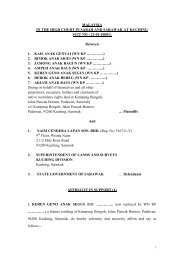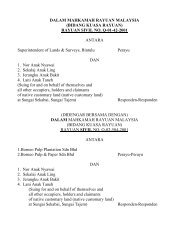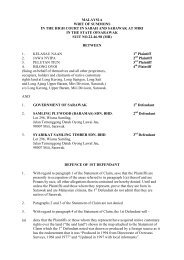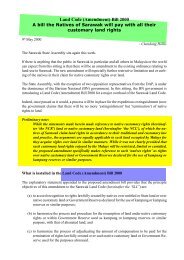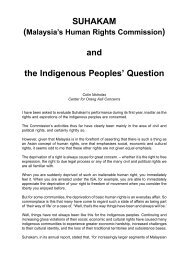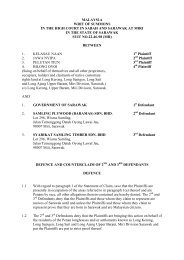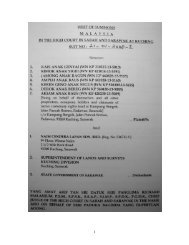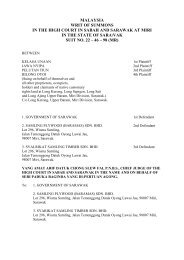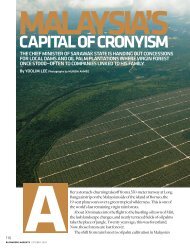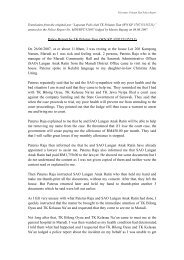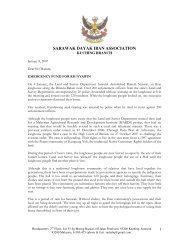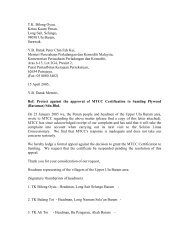A Report on the Malaysian Timber Certification Scheme - Rengah ...
A Report on the Malaysian Timber Certification Scheme - Rengah ...
A Report on the Malaysian Timber Certification Scheme - Rengah ...
Create successful ePaper yourself
Turn your PDF publications into a flip-book with our unique Google optimized e-Paper software.
The list of organisati<strong>on</strong>s attending <strong>the</strong> informal c<strong>on</strong>sultati<strong>on</strong>s in Peninsular Malaysia shows a balance<br />
of interests. However, in Sabah and Sarawak <strong>the</strong>re was no organisati<strong>on</strong> in <strong>the</strong> stakeholder group to<br />
represent social and independent envir<strong>on</strong>mental interests (NTCC 2000a, Annex I, in Sandom & Simula<br />
2001:11). In additi<strong>on</strong>, <strong>the</strong> timeframe for <strong>the</strong>se state-level c<strong>on</strong>sultati<strong>on</strong>s was very limited. From <strong>the</strong><br />
available documentati<strong>on</strong>, it appears that <strong>on</strong>ly about <strong>on</strong>e m<strong>on</strong>th was available before <strong>the</strong> nati<strong>on</strong>al<br />
c<strong>on</strong>sultati<strong>on</strong> and finalisati<strong>on</strong> of <strong>the</strong> MC&I took place (Sandom & Simula 2001:9).<br />
Sandom & Simula’s study of <strong>the</strong> process reveals that, from <strong>the</strong> beginning, <strong>the</strong> scheme initiator lacked<br />
a comprehensive understanding of <strong>the</strong> need for <strong>the</strong> broad-based participati<strong>on</strong> of all interest groups.<br />
The process was <strong>the</strong>refore seen as an after-thought and <strong>the</strong>re was insufficient preparati<strong>on</strong> and little<br />
room to properly equip <strong>the</strong> stakeholders with <strong>the</strong> necessary informati<strong>on</strong> and skills for meaningful<br />
participati<strong>on</strong>. It should, however, be acknowledged that in <strong>the</strong> <strong>Malaysian</strong> c<strong>on</strong>text a multi-stakeholder<br />
c<strong>on</strong>sultati<strong>on</strong> was a relatively new approach. MTCC acknowledges it was <strong>on</strong> a steep learning curve in<br />
facilitating and organising <strong>the</strong>se c<strong>on</strong>sultati<strong>on</strong>s. 9<br />
A nati<strong>on</strong>al–level c<strong>on</strong>sultati<strong>on</strong> <strong>on</strong> <strong>the</strong> MC&I was held in October 1999: 85 interested groups were<br />
invited and 58 organisati<strong>on</strong>s participated. Of those invited, more than half of <strong>the</strong>m (44) represented<br />
ec<strong>on</strong>omic interest groups, while 17 of <strong>the</strong>m were social and envir<strong>on</strong>mental organisati<strong>on</strong>s. The rest<br />
were government, research and academic institutes. There were 111 participants representing <strong>the</strong> 58<br />
organisati<strong>on</strong>s that attended this nati<strong>on</strong>al c<strong>on</strong>sultati<strong>on</strong>. Approximately 28% of <strong>the</strong> participating organisati<strong>on</strong>s<br />
were government agencies, 46% were trade and industry associati<strong>on</strong>s, 5% were academic/<br />
research instituti<strong>on</strong>s and 21% were NGOs (NTCC 2000a).<br />
The first versi<strong>on</strong> of<br />
<strong>the</strong> MC&I was<br />
adopted during<br />
<strong>the</strong> nati<strong>on</strong>al c<strong>on</strong>sultati<strong>on</strong>,<br />
despite<br />
<strong>the</strong> reservati<strong>on</strong>s<br />
The first versi<strong>on</strong> of <strong>the</strong> MC&I was adopted<br />
despite <strong>the</strong> reservati<strong>on</strong>s of five NGOs who<br />
stressed <strong>the</strong> importance of recognising native<br />
customary rights, rules, practices and values.<br />
of five NGOs who stressed <strong>the</strong> importance of recognising native customary rights, rules, practices<br />
and values in <strong>the</strong> MC&I (Y<strong>on</strong>g 2001:43-45) and proposed that certificati<strong>on</strong> in Sarawak be deferred.<br />
The nati<strong>on</strong>al level c<strong>on</strong>sultati<strong>on</strong> was followed by a Workshop <strong>on</strong> Forest Certificati<strong>on</strong> jointly organised<br />
by <strong>the</strong> NTCC, FSC, WWF, TFT (Tropical Forest Trust) and GTZ (German Agency for Technical<br />
Cooperati<strong>on</strong>) in December 2000 had 167 participants. Discussi<strong>on</strong>s focused <strong>on</strong> issues surrounding<br />
<strong>the</strong> harm<strong>on</strong>isati<strong>on</strong> of standards between <strong>the</strong> FSC and <strong>the</strong> MC&I, and also <strong>on</strong> <strong>the</strong> formati<strong>on</strong> of a<br />
Nati<strong>on</strong>al Steering Committee (NSC) to oversee standards development. From <strong>the</strong> minutes of <strong>the</strong><br />
workshop, it seems that ec<strong>on</strong>omic interest groups, forest managers and o<strong>the</strong>r government organisati<strong>on</strong>s<br />
dominated <strong>the</strong> discussi<strong>on</strong>. They insisted <strong>on</strong> a fourth chamber for ‘Direct Resource Managers’ in<br />
additi<strong>on</strong> to <strong>the</strong> existing social, envir<strong>on</strong>ment and ec<strong>on</strong>omic chambers. In <strong>the</strong> subsequent NSC meeting,<br />
a WWF Malaysia representative questi<strong>on</strong>ed <strong>the</strong> interests of <strong>the</strong> direct resource management<br />
group and flagged <strong>the</strong> fact that this group could be biased towards <strong>on</strong>e particular interest (NSC<br />
Minutes 24 April 2001). Never<strong>the</strong>less, this expanded structure of <strong>the</strong> NSC went unchanged.<br />
Of <strong>the</strong> 20 organisati<strong>on</strong>s representing social and envir<strong>on</strong>mental interests in <strong>the</strong> Workshop <strong>on</strong> Forest<br />
Certificati<strong>on</strong>, half of <strong>the</strong>m issued a joint statement to express <strong>the</strong>ir c<strong>on</strong>cern that <strong>the</strong>y had not been<br />
adequately c<strong>on</strong>sulted. A total of 13 NGOs eventually withdrew from <strong>the</strong> process in July 2001 in<br />
protest that <strong>the</strong>ir views and opini<strong>on</strong>s had not been taken into c<strong>on</strong>siderati<strong>on</strong>, particularly <strong>on</strong> <strong>the</strong> issue<br />
of indigenous peoples’ rights within FMUs (Y<strong>on</strong>g 2002:133-135). These groups formed JOANGOHutan,<br />
Malaysia – a network of n<strong>on</strong>-governmental, community and indigenous peoples’ organisati<strong>on</strong>s. They<br />
demanded that ‘… <strong>the</strong> process for <strong>the</strong> development of standards and criteria for timber certificati<strong>on</strong><br />
be participatory, c<strong>on</strong>sultative, open, transparent and involve representati<strong>on</strong> of all key stakeholder<br />
groups at all levels who have a genuine interest in forest management and c<strong>on</strong>servati<strong>on</strong> in Malaysia’<br />
(Y<strong>on</strong>g 2002:130).



